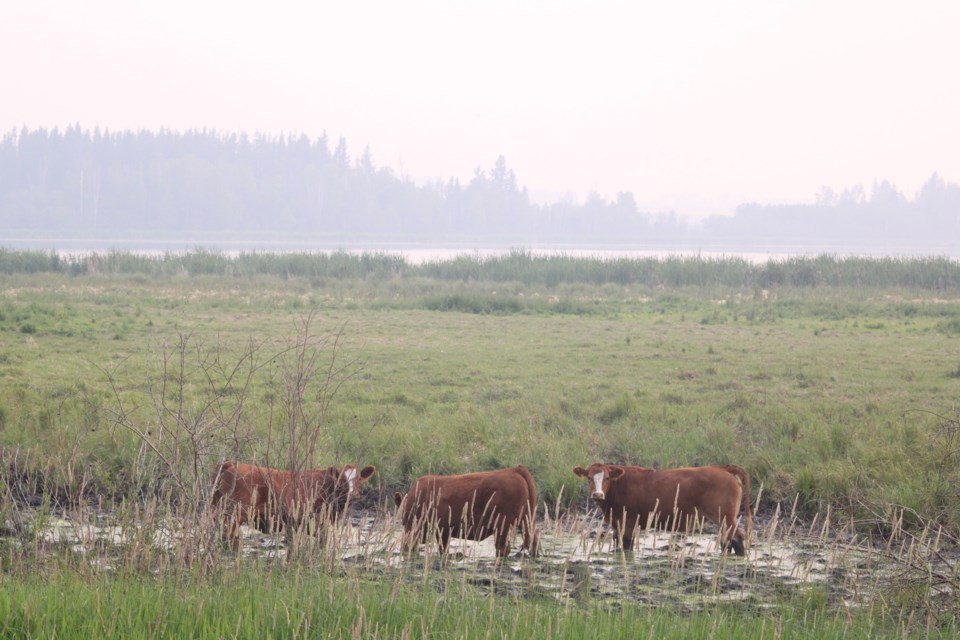Recent smoky conditions from wildfires this summer has local officials looking into potential health implications for livestock and house pets.
At the same time, the same officials say there isn’t an immediate threat to animals in Lac La Biche County — as of yet.
“Despite air quality warnings across the province, the Lakeland region has been spared most of the severe effects of wildfire smoke,” said Jacob Marfo, agricultural fieldman for Lac La Biche County. “We’ve been very lucky.”
The situation could be much worse, he says, explaining that if smoke becomes severe enough, livestock can be afflicted with asthma and bronchitis, which can take a significant toll on a local agricultural economy.
Marfo said farmers and ranchers in the region are aware of the issue and are taking precautionary measures to minimize the effects of smoke inhalation in their livestock.
“Farmers must ensure that their animals are drinking plenty of water, which reduces congestion and allows them to breathe easier,” Marfo, said, explaining that that heavy wildfire smoke can have a detrimental effect on the breathing capabilities of livestock, affecting their lungs, but also causing stress from burning eyes and running noses.
“The severity of the smoke hasn’t been as high as other Alberta communities,” he said, adding that local farmers invited to a recent meeting about general issues in the agriculture sector didn't note any significant issues relating to wildfire smoke in their livestock so far. “During a meeting on July 7, none of the producers in attendance voiced any direct concerns about this issue.”
To date, local veterinarians have had no calls to treat livestock suffering from the effects of wildfire smoke. Again, it is believed to be because the Lakeland area has not had the severe smoke coverage that other communities have experienced.
“We’ve been very fortunate,” says Dr. Rajdeep Samra of the Lakeland Animal Care Group. “In other years, we’ve received many calls for assistance, but this year has been very quiet.”
Samra explained that exposure to wildfire smoke – depending on the level of intensity - is dangerous for outside animals, often resulting in respiratory issues.
While it hasn't been an issue so far this year, wildfire smoke is always a potential risk, and producers are ready.
“Most farmers and ranchers have medication at home, particularly different types of antibiotics, which are used frequently during calving season,” Samra continued.
It's not just livestock that needs to be monitored during fire season, says Jewel Hampshire with the Lac La Bcihe Regional Humane Society.
House pets can also react to environmental changes. And while the smoky skies have not had immediate effects on small animals at the shelter, Hampshire says it is a concern to watch for
“So far, we have not noticed any coughing or wheezing in the animals, though it’s something we’re always mindful of,” Hampshire explained, saying that owners of household pets are strongly advised to keep them inside if they notice any symptoms of smoke inhalation.
“At times when air quality is very bad, people should shut all windows and doors until such time as conditions improve,” she continued. “If the problem becomes severe enough, animals may require veterinary care.”
All agree that when air quality numbers are high enough to keep children and adults inside, it's a reminder to keep animals safe as well.
Heading toward the weekend, the Environment Canada Air Quality Health Index — which rates air quality from one to 10 — for the Lakeland region was at "3" or 'moderate to low.' But it was expected to rise to "7" or "High Risk" by the weekend in the Janvier and Conklin areas. At the same time, the index for northwestern Alberta was listed at 10+ or a "Very High" risk.
Environment Canada recommends avoiding strenuous outdoor activities when the index rises to 7 or above.


